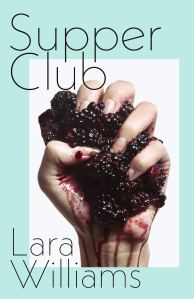 I haven’t read any of this year’s Booker Prize longlist yet, but I have read two of the novels shortlisted for the Guardian’s Not the Booker prize which recognises an alternative selection of eligible books chosen by the public, judges and book champions. ‘Spring’ by Ali Smith wouldn’t look out of place on this year’s official Booker Prize longlist which mostly consists of novels by established authors, although I have read that her novels are no longer submitted to literary awards for consideration. It is the third book in Smith’s quartet of seasonally themed novels following Autumn (which was shortlisted for the Man Booker Prize in 2016) and Winter.
I haven’t read any of this year’s Booker Prize longlist yet, but I have read two of the novels shortlisted for the Guardian’s Not the Booker prize which recognises an alternative selection of eligible books chosen by the public, judges and book champions. ‘Spring’ by Ali Smith wouldn’t look out of place on this year’s official Booker Prize longlist which mostly consists of novels by established authors, although I have read that her novels are no longer submitted to literary awards for consideration. It is the third book in Smith’s quartet of seasonally themed novels following Autumn (which was shortlisted for the Man Booker Prize in 2016) and Winter.
‘Spring’ follows two main characters: Richard is a director who has recently lost his soulmate, Paddy, and Brittany works in a detention centre for migrants. It shares the same traits and themes as the previous volumes including an appreciation of overlooked 20th century female artists (Tacita Dean in this case) and riffs on contemporary politics, particularly Brexit, through wordplay, puns and comparisons with historical events. Even though many of the artistic references are fairly obscure, I like that Smith writes intelligently in a way that doesn’t seek to alienate the reader.
Overall, I found ‘Spring’ slightly less engaging than the previous two volumes. I think this is because I have read each of the three books in the months after they have been published, so I have probably missed many of the overlapping concepts which would be more apparent if I had read them all close together. However, I look forward to seeing how this interesting literary experiment concludes when ‘Summer’ is published next year.
 In the Guardian this week, Olivia Sudjic wrote about what makes a “millennial novel” and if the criteria in the article’s headline are anything to go by – “darkly funny, desperate and full of rage” – then ‘Supper Club’ by Lara Williams ticks all of the essential boxes. It tells the story of Roberta who is in her late twenties, has a dull job working for a fashion website and is reluctant to pursue her passion for food. She meets Stevie which quickly develops into an intense friendship and she sets up Supper Club, a secret society for hungry women disappointed by men and in need of a space to be themselves and break convention, and involves Roberta cooking giant feasts usually in illegal locations. The story flits back and forth between the present day and ten years earlier during Roberta’s student years, recounting a rape by another student and an unhealthy relationship with Arnold, one of her philosophy lecturers.
In the Guardian this week, Olivia Sudjic wrote about what makes a “millennial novel” and if the criteria in the article’s headline are anything to go by – “darkly funny, desperate and full of rage” – then ‘Supper Club’ by Lara Williams ticks all of the essential boxes. It tells the story of Roberta who is in her late twenties, has a dull job working for a fashion website and is reluctant to pursue her passion for food. She meets Stevie which quickly develops into an intense friendship and she sets up Supper Club, a secret society for hungry women disappointed by men and in need of a space to be themselves and break convention, and involves Roberta cooking giant feasts usually in illegal locations. The story flits back and forth between the present day and ten years earlier during Roberta’s student years, recounting a rape by another student and an unhealthy relationship with Arnold, one of her philosophy lecturers.
It’s easy to see why ‘Supper Club’ has been tipped as one of the debut novels to watch this year – whether intentional or not, it’s very zeitgeisty, particularly where the issue of women occupying their own space is concerned, and the portrayal of Roberta’s character is nuanced and psychologically astute, most notably in the depiction of her isolated emotional state. Some aspects don’t really go anywhere such as Roberta’s relationship with her dad who has suddenly got back in touch having not seen her since she was seven, but I also liked that ‘Supper Club’ is not the kind of coming-of-age story which tries to neatly resolve all of the different elements, and overall, I really enjoyed this subversive and satisfying novel.





Despite being a millennial, I’m getting a bit tired of ‘millennial novels’ – They don’t seem to add much to previous coming-of-age stories from e.g. the 00s. But then maybe I just wish that I was ‘darkly funny, desperate and full of rage’…
LikeLike
Ha! I wonder how long it will take for the “post-millennial” novels to appear…
LikeLiked by 1 person
I so appreciate your well-curated and articulate reviews. Someday, maybe, I’ll take a more orderly approach to my reading!
LikeLike
Thank you!
LikeLike
Admittedly, something about the cover for Supper Club caught my eye? I’m not sure why. But, here we are. Definitely piqued my interest upon reading about it.
LikeLike
It’s a very eye-catching cover!
LikeLike
I wasn’t taken with Spring, found it a bit dry and not as rich as How to be Both, which I enjoyed. But I will give Winter and Spring a go each to see how the cycle builds.
LikeLike
Yes, I can now see that they are best read together rather than big gaps.
LikeLike
I’ve been waiting for Ali Smith to finish her quartet, so I can read them all together, but the downside is that I’m excited to pick them up and having to wait 🙂
I have to admit that I didn’t find Supper Club satisfying. I felt like the main character changed over time, but it wasn’t clear to me what prompted her changed perspective. And I like I more deterministic ending, as a general rule. I also wasn’t sure what point the author was trying to make or how the recipes connected to the story. I love your description of the book as ‘zeitgeisty’ though. It definitely felt connected to many conversations currently happening in the media and online.
LikeLike
Sorry for the late reply. Hope you enjoy the Ali Smith quartet. Although I wasn’t completely blown away by the latest volume, the project as a whole is very impressive. I agree about the ending of Supper Club – not entirely clear what point the author was making but as a depiction of the issues facing millennial women, it was very convincing.
LikeLike
Pingback: Three Short Story Collections I’ve Read Recently | A Little Blog of Books